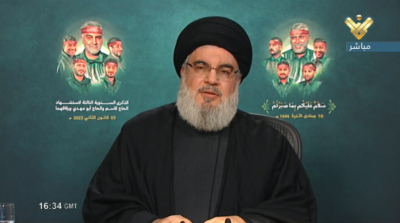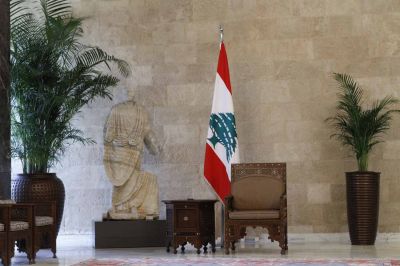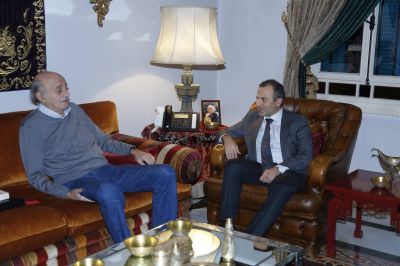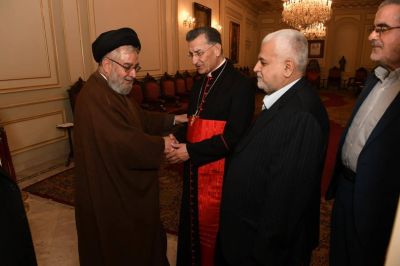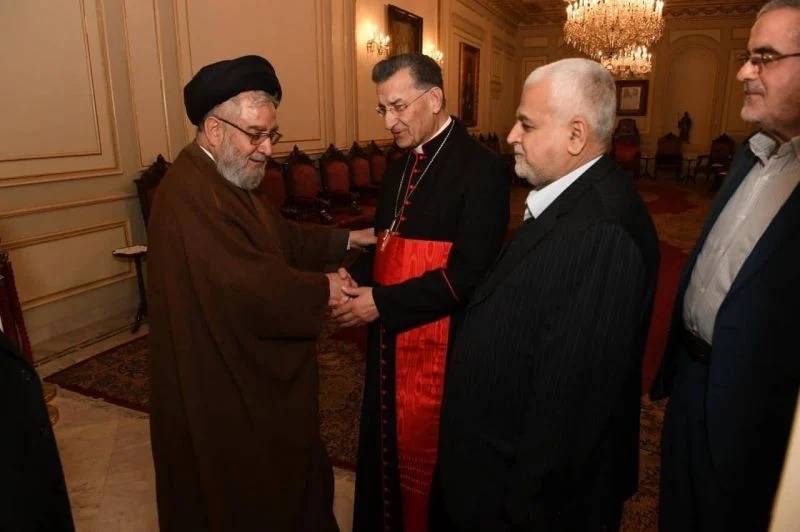
Maronite Patriarch Bechara al-Rai receives Ibrahim Amin al-Sayed at the head of a Hezbollah delegation on Monday in Bkirki. (Credit: Photo taken from the Facebook page of the Maronite Patriarchate)
“We do not have any veto on anyone,” the chairman of Hezbollah’s political council, Ibrahim Amin al-Sayed said on Monday during a press briefing, in response to a question about a possible election of army chief Gen. Joseph Aoun to the presidency.
Aoun’s name has been circulating for months behind the scenes as a potential consensus presidential candidate.
This was the first time that Hezbollah has made such a clear statement about the army chief’s candidacy.
In addition to showing openness to a broader political compromise around the presidential election, Hezbollah wanted to send a message to an ally who has been giving it a hard time: Free Patriotic Movement leader Gebran Bassil, who categorically refuses to endorse Aoun, and is also opposed to the election of Marada leader Sleiman Frangieh, Hezbollah’s preferred candidate.
Bassil appears to be digging in his heels, raising the stakes against his only ally, further undermining his party’s 2006 Mar Mikhael Agreement with Hezbollah.
The visit of a Hezbollah delegation to Bkirki took place in an attempt to return to normal relations with the Maronite church, which have been shaken since July, due to the arrest of Bishop Moussa al-Hage at the southern border post of Naqoura.
Relations between the two are also tense because of Maronite Patriarch Bechara al-Rai’s constant calls for Lebanon’s neutrality and his criticism of the March 8 camp, which he accuses of blocking the election of a president.
The visit to Bkirki allowed Hezbollah to fulfill a key objective: to send the right messages from the platform of the highest Christian religious authority in the country.
The party was careful to show itself open to a consensus presidential candidate, instead of appearing intractable in its support for a candidate that Rai might not endorse based on his stance of rejecting the possible election of a president who would be affiliated with a specific political camp.
Speaking after the meeting with Rai, Sayed said that between his party and Bkirki, “there are no differences, but different points of view.”
Asked about a possible election of the commander-in-chief of the Lebanese Army, Sayed assured that Hezbollah “has not imposed a veto on anyone,” stressing that his party will “agree to a compromise” that might lead to the election of Gen. Joseph Aoun.
These remarks came a few weeks after a meeting between Walid Ghayad, the Maronite church’s spokesman, and Mohammad Khansa, Hezbollah’s emissary, as part of efforts by Hezbollah to reach an agreement on the name of the future head of state and in a bid to pave the way to Baabda for Frangieh, presenting him as a consensus figure.
‘No Plan B’
However, the pertinent question is: is Hezbollah now willing to drop Frangieh in favor of Joseph Aoun? No, according to Hassan Nasrallah’s right-hand man, Hussein Khalil, when contacted by L’Orient-Le Jour.
“Sleiman Frangieh is our candidate,” Khalil said. “This is our plan A, and there is no plan B.”
Khalil said that Sayed was clear in stressing that “the relationship between Hezbollah and Gen. [Joseph] Aoun is one thing, and the issue of the presidential election is another.”
The head of Hezbollah’s political council spoke out in favor of a president “with popular and political weight,” an asset that the army chief does not have.
This might imply that while Hezbollah will not endeavor to see Aoun ascend to the presidency, it will also not hinder a broader agreement that would go in that direction.
“Hezbollah’s stance is not something new,” Kassem Kassir, a journalist close to the party said. “The party is aware that the election of a president will only be the result of an agreement. It, therefore, leaves the door open to a compromise.”
Bassil opts for verbal escalation
However, Hezbollah’s openness to other options carries a message to Bassil: the Party of God could override the FPM veto to endorse a possible agreement around the army chief — a point of view that the FFM does not share.
“The fact that Hezbollah makes a distinction between the presidential election and relations with Joseph Aoun is a positive thing,” Ghassan Atallah, FPM MP for Chouf, told L’Orient-Le Jour.
According to him, “everyone knows that Sleiman Frangieh, Michel Moawad (candidate of some opposition parties), and even Joseph Aoun have no chance of being elected.”
“This highlights the importance of Bassil’s initiative which he will launch soon to call for the election of a candidate whose name has not yet been placed on the table yet,” Atallah added.
In the meantime, the FPM leader has opted for escalation against his Shiite ally.
In an interview with the news website Assas, Bassil reiterated his opposition to the option of Frangieh, because “this candidate does not correspond to the reformist project that the country needs.”
He also said he was against the election of Joseph Aoun, who “has no program.”
Bassil went as far as to say that he was ready to put his candidacy back on the table if his
“provisional concession” is interpreted as “a sign of weakness” of the FPM.
This is another message to Hezbollah, with whom the agreement is “hanging by a thread,” according to Bassil.
The FPM leader has been engaged in a tug-of-war with Hezbollah against the backdrop of differences over the presidential election. Things took a turn for the worse in early December when the caretaker cabinet convened a session amid the presidential vacuum — a move that was approved by Hezbollah.
Bassil’s political turbulence, however, does not seem to bother Nasrallah’s party.
“We are not the same party, and he is free to do what he wants,” Khalil said.
Meanwhile, from Bkirki, Sayed went as far as to say, “Gebran Bassil was never under Hezbollah’s thumb to say he no longer is today.”
This article was originally published in French in L'Orient-Le Jour. Translation by Sahar Ghoussoub.
